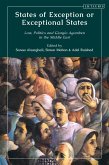The so-called 'Cedar Revolution' in Lebanon, triggered by the assassination of the former Prime Minister Rafiq Hariri in February 2005, brought to an end three decades of Syrian military presence in the country. Here, Taku Osoegawa challenges the commonly-held claim that Lebanon and its leaders were simple puppets of the Syrian regime during the thirty years characterised as Lebanon under Syrian hegemony.
Furthermore, by investigating Lebanon's own reasons for aligning itself with Syria, Syria and Lebanon aims to answer the following question: which theories of international relations are most relevant or best-suited to explain Lebanon's relations - particularly its bandwagoning - with Syria from 1970 (when the Asad regime was established) to the present day? By focusing on the actions and attitudes taken by Lebanon's political leadership, specifically the presidents and prime ministers, towards Syria, Osoegawa considers the applicability of the following theories: simple realism, complex realism, constructivism and complex interdependence.
Syria and Lebanon also considers the ways in which the relationship between these two central states in the Middle East has developed since the Syrian withdrawal. For example, Osoegawa looks at the reasoning behind Syrian intransigence over the Special Tribunal for Lebanon and Hizbullah's weapons, and the consequences of the turmoil and violence which Syria has experienced since early 2011. This book's analysis is essential not only for the study of the relationship between Lebanon and Syria, but also their impact on political stability in the wider Middle East.
Furthermore, by investigating Lebanon's own reasons for aligning itself with Syria, Syria and Lebanon aims to answer the following question: which theories of international relations are most relevant or best-suited to explain Lebanon's relations - particularly its bandwagoning - with Syria from 1970 (when the Asad regime was established) to the present day? By focusing on the actions and attitudes taken by Lebanon's political leadership, specifically the presidents and prime ministers, towards Syria, Osoegawa considers the applicability of the following theories: simple realism, complex realism, constructivism and complex interdependence.
Syria and Lebanon also considers the ways in which the relationship between these two central states in the Middle East has developed since the Syrian withdrawal. For example, Osoegawa looks at the reasoning behind Syrian intransigence over the Special Tribunal for Lebanon and Hizbullah's weapons, and the consequences of the turmoil and violence which Syria has experienced since early 2011. This book's analysis is essential not only for the study of the relationship between Lebanon and Syria, but also their impact on political stability in the wider Middle East.









